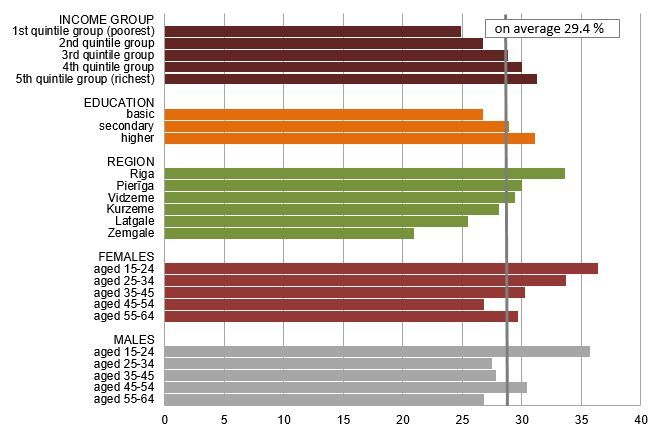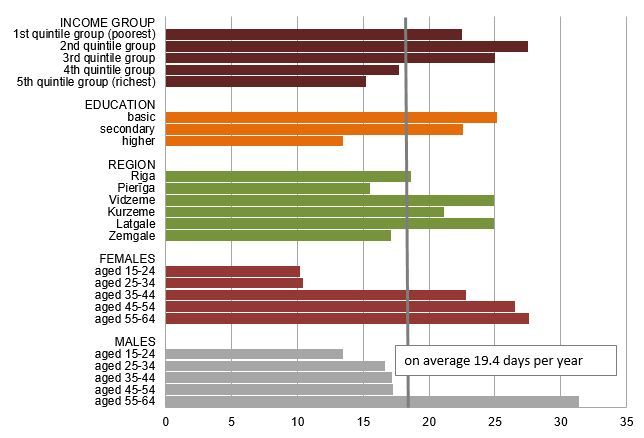Analytics, Employment, Health, Latvia, Markets and Companies
International Internet Magazine. Baltic States news & analytics
Friday, 19.04.2024, 11:10
In 2014, 29.4% employed persons in Latvia were absent from work due to health problems
 Print version
Print version
In 2014, employed persons due to health problems were absent from work totally for 5 million days. Young people, as well as employed persons earning higher income were absent from work more often. However, longer absence periods were observed among elderly, persons receiving lower income, people with low educational attainment, as well as persons employed in Vidzeme and Latgale regions.
Employed persons with lower income are absent from work due to health problems more rarely. In 2014, 24.9% of employed persons with lower income (1st quintile group) were absent from work due to health problems – 4.5% less than on average in Latvia and 6.4% less than persons with higher income (5th quintile group).
Generally, absence from work due to health problems is more common among younger people (34.6% of females aged 15–24, 33.7% of females aged 25–34, and 35.7% of males aged 15–24), residents with higher income (31.3%), people higher education (31.1%), as well as persons employed in Riga (33.6%). Notably smaller number of employed persons are absent from work due to health problems in Zemgale and Latgale region – 20.9% and 25.5%, respectively.
 |
| Share of employed persons absent from work due to health problems, 2014 (%) |
Data source: European Health Interview Survey 2014
In 2014, employed persons absent from work due to health problems on average were ill for 19.4 days per year (in 2008 – 21.1 day). Duration of absence recorded the most often (61.1%) comprises 10 or less days. 35.5% of employed were absent from work for 5 days or less, while 26.6% of employed persons were absent for 11–30 days, and 12.3% – for more than a month. Regional breakdown of the statistics indicates the longest health-related absence from work in Pierīga region (on average 15.5 days per year), while the shortest – in Vidzeme and Latgale region (on average 24.9 days per year).
Breakdown among genders does not show notable differences (on average 18.6 days per year among males and 20.2 days per year among females), however such breakdown indicates differences among several age groups. Employed persons aged 15–24 due to health problems were absent from work on average for 12 days a year (males for 13.5 and females for 10.2), while people aged 55–64 were absent for notably longer time – on average for 29.2 days a year (males for 31.4 and females for 27.6).
The lower socio-economic position of an employed person, the greater number of days absent. Employed persons with higher education were absent on average for 13.5 days a year, while people with secondary education – for 22.6 days, and residents that have attained basic education – for 25.2 days. Employed persons in the lowest income group (1st quintile group) were absent from work on average for 22.5 days a year, while persons earning the highest income (5th quintile group) – for 15.2 days a year.
 |
| Average number of days absent from work due to health problems, 2014 |
Data source: European Health Interview Survey 2014
Data on Latvia population absence from work due to health problems in 2014 were acquired within the framework of the European Health Interview Survey (EHIS). The survey covered 7 thousand Latvia residents aged over 15. The indicator includes number of days absent recorded in administrative registers, as well as absence from work, for which sick-leave certificate was not issued, or unpaid absence due to illness. The indicator does not include absence from work due to childbirth or illness of a child.
The surveys is aimed at acquiring information on European Union (EU) population self-perceived health status, lifestyles, use and availability of health care services in relation to socio-economic indicators of the population. EHIS was conducted in all EU Member States, as well as in Iceland and Norway. The results acquired within the survey will be used for socio-economic policy planning in each Member State separately and EU as a whole.








 «The Baltic Course» Is Sold and Stays in Business!
«The Baltic Course» Is Sold and Stays in Business!

